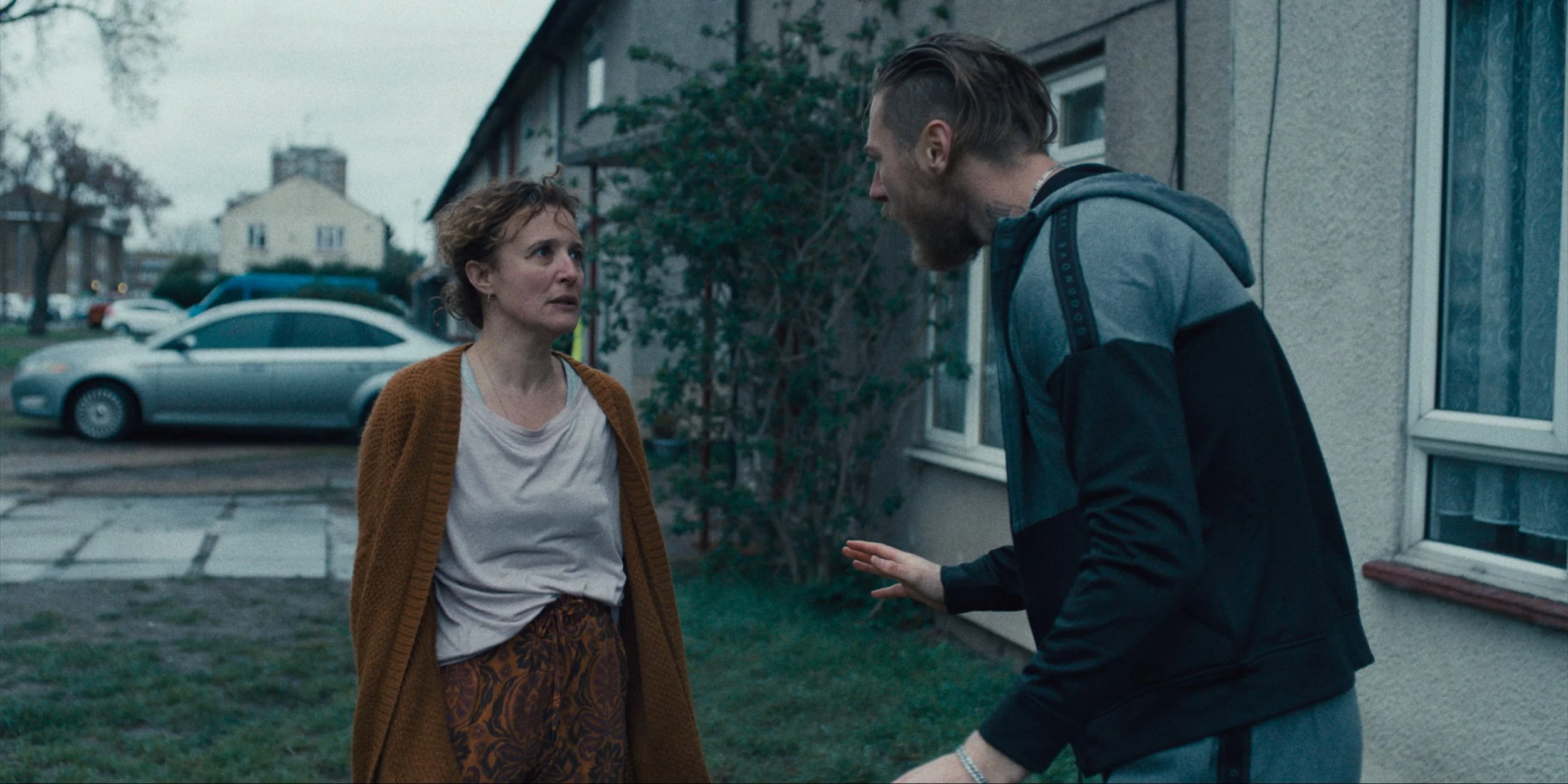IN CONVERSATION WITH JED HART AND LYNDSEY MARSHAL
Jed Hart's feature directorial debut, RESTLESS, follows social care worker Nicky's (Lyndsey Marshal) nightmarish ordeal when the neighbours from hell move in next door. Music and alcohol-fuelled parties rage through the night, driving Nicky from her own home. The rising tension between the empty nester and her neighbour Deano (Aston McAuley) leads the pair towards a horrifying resolution.
Hart previously wrote and directed the 2018 short film, CANDY FLOSS, about a young girl (Grace Hogg-Robinson) who finds a kindred spirit in a travelling showman (Barry Keoghan), who, like her, has a past he'd rather forget. Their connection, however, doesn't come without peril.
Lyndsey Marshal's onscreen credits include Clint Eastwood's HEREAFTER (2010), Oliver Frampton's council estate horror THE FORGOTTEN (2014), and TRESSPASS AGAINST US (2016), in which she starred opposite Michael Fassbender and Brendan Gleeson. She has also performed the part of Emilia in the National Theatre's 2013 production of OTHELLO.
In conversation with Gore In The Store, Hart and Marshal discussed the intensity of the film's shoot, the erosion of community, directorial influences, and melancholic feelings about the London Underground.
A feature debut is a milestone. Why did you choose RESTLESS to represent this moment, and how do you look back on the experience?
Jed Hart - Well, there are a few answers to that. My producer [Benedict Turnbull] and I have been working together since we did a short about eight years ago. We had quite a few projects on the go that were a little bit bigger. They were still indie movies, but probably ten times the budget of this. We've had stuff get quite close to being made and then fall through — a lot of dips in the road. Benedict came to me with the idea of doing something on a very low budget and quite contained and asked whether I had an idea.
It just so happened I'd been dealing with my own problems with the neighbours above me. Naturally, I settled upon this idea of the nightmare neighbours, which I thought was a universal premise people could relate to. I thought it hadn't been done in the way that I saw it, which was to try and make a film that could really put you in the character's shoes, that is very intense, experiential, and audiovisual.
That's where the movie came from and, in terms of the process of making it, it was an intense shoot because we only had three weeks. As a first feature, that helped because I'd shot a short that was a five-day shoot, and going from a five-day shoot to a fifteen-day shoot isn't that different. It wasn't like having to go to a two-month shoot where you really have to pace yourself. It was one that you could go in and not sleep a lot for three weeks and just get as much as you can in the bag.
When you first read the script for RESTLESS Lindsey, what was it that appealed to you? And were you able to use the time pressure of the shoot to help tell a story about a character being pushed to breaking point?
Lyndsey Marshal - Yes, one hundred percent because, in terms of time, every day was so full. There was no, "Okay, you're off now for four scenes" or "You've got two hours off." It was continuous and quite confined because we were actually filming in the house, so you didn't have any space to get away. I was there all the time, and it adds to those feelings of frustration, and being absolutely worn out by it. I got really angry sometimes and by the end I felt trapped. This made filming difficult, but it adds to the performance and the feeling in many ways.
I read the script, and I thought this feeling of neighbours from hell or noises that you get obsessed with is universal. In our street, we had this very high-pitched noise that had been going on for over a year. It turns out that it was part of someone's boiler that had broken. I had friends say, "What the hell is that noise?" At one point I thought, 'Well, maybe this is it. Maybe I'm just gonna have to move.' But as a community, unlike in this film, we all got to the bottom of it as a group. For a while, it drove me mad and when it stopped, I was really grateful. So, the film has that universal theme that makes it appealing because everybody's experienced that kind of annoyance.
RESTLESS is not only about neighbours from hell, but also how personal space and privacy are at a premium. Social media is somewhat responsible for certain cultural shifts, but for introverts and private people, the world is becoming an increasingly hostile place.
JH - There's definitely the idea of the erosion of community, or certainly in the old-school sense of the local community around you. People move around a lot more than they used to, and so, you don't have those people that you grew up with, or perhaps you even work with living on your street. We're much more cut off from our neighbours, and housing quality is becoming poorer. A lot of the problems that I had were because I lived in a house that had been turned into four or five flats. That's happening up and down the country because of the housing shortage. We're living in spaces that weren't designed as homes, and I think those problems all feed into it.
LM - I'm noise-sensitive, and I find the [London] tube so hard now. I miss the days when there was no reception. People are now watching full films, videos, and TikTok with no earphones, as well as having loud conversations on the tube. It drives me mad, because why do you want to listen to someone else's conversation? Why have I got to watch you watching TikTok videos about dogs at full volume? And it does encroach on your space. It is this thing that no one can ever be bored. Instead, you've got to be doing something all the time.
When I was little, we'd have that thing of community, I suppose. Everybody knew everyone; everyone was in each other's houses. Birthday parties would go on all night. It was a real sense that everyone knew each other, which also has drawbacks. I've gone off piece a little, but this film does tap into this world of not being able to have any space.
In your director's statement, Jed, you suggested a desire to branch out from the British social realist tradition. Were there any other styles of storytelling that you sought to explore?
JH - I certainly wanted to take influence from British kitchen sink dramas, which there's plenty of in RESTLESS. I wanted it to be a film that starts as that but then grows out in different directions — certainly, psychological thrillers. Something that I love is the Polanski-esque vibe of the character's stress and psyche bleeding out onto the screen, and sometimes these little surreal or heightened melodramatic moments. I wanted something that started out mundane but became almost operatic in scale, in line with how she's feeling and how it's affecting her stress.
RESTLESS is deliberately structured around opposites, that almost contrasts ideas of high and low culture. From Nicky and Deano's different tastes in music, to him teaching young people to box on his front lawn and Nicky working as a carer, everything leans into these juxtapositions.
JH - I wanted to find two characters that were as opposite as possible, so that clash would be as strong as possible. Nicky has traditional values, and she has lived near to her family. It feels like she has had that kind of community in the past, whereas Deano's from a younger generation, where he hasn't had that community at all and he's very much self-centred. I don't think he's necessarily an evil character. I don't think he moved into the house with the intention of disturbing her. He just doesn't give a shit — he just has no social awareness.
LM - It's that thing of what it is to work as well — to actually go out and do a job every day and having to sleep because you've got to get up to go to work. Deano doesn't work; he doesn't have a job. When I was at drama school or even before, when I did any youth theatres, I had to work at the school on the weekends photocopying. I always had to work to do anything that I wanted to do, and when I left [drama school], I worked bar jobs and cafés or worked in gyms. You have a different mentality if you're working. So, I like that conflict between them — he doesn't really get where she's coming from, and she doesn't get where he's coming from, which makes for brilliant drama.
Paul Risker
RESTLESS screened at the 2025 Glasgow Film Festival and was released theatrically in the UK on April 4.





